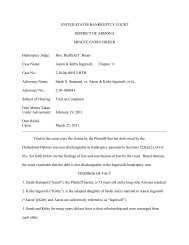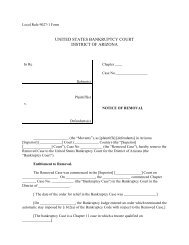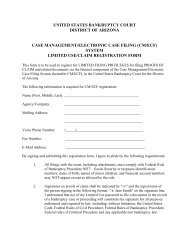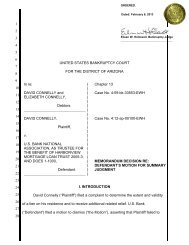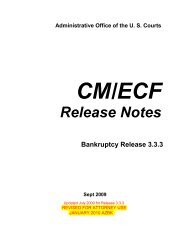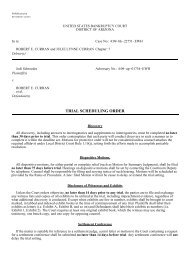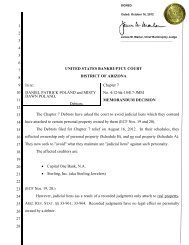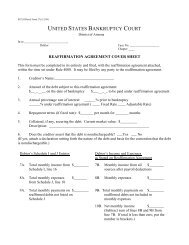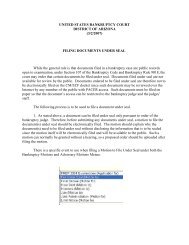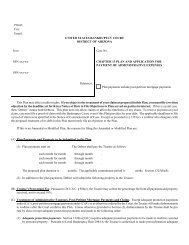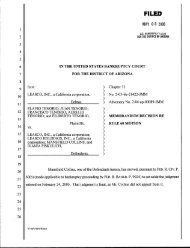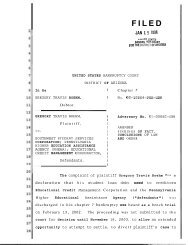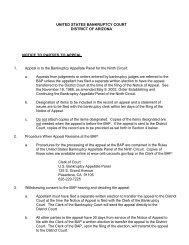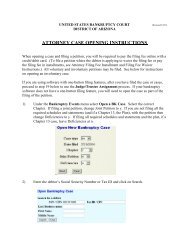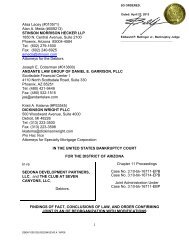Chapter 13 Rules - United States Bankruptcy Court - District of Arizona
Chapter 13 Rules - United States Bankruptcy Court - District of Arizona
Chapter 13 Rules - United States Bankruptcy Court - District of Arizona
Create successful ePaper yourself
Turn your PDF publications into a flip-book with our unique Google optimized e-Paper software.
RULE 2084-1.<br />
SCOPE – CHAPTER <strong>13</strong> RULES<br />
Local <strong>Rules</strong> 2084-1 through 2084-26 govern chapter <strong>13</strong> practice in cases filed after<br />
October 16, 2005.<br />
RULE 2084-2. FILING REQUIREMENTS<br />
(a) Application to Pay Fee in Installments. If the debtor is not paying the<br />
entire fee with the petition, the debtor shall file with the petition an application for<br />
payment <strong>of</strong> the filing fee in installments.<br />
(b) Statement <strong>of</strong> Financial Affairs and Operating Reports. If the debtor is<br />
self employed or engaged in business, the debtor also shall:<br />
(1) Complete the portion <strong>of</strong> the Statement <strong>of</strong> Financial Affairs for a debtor<br />
who is self employed or engaged in business; and<br />
(2) File a monthly operating statement for the month in which the debtor filed<br />
the petition and ongoing monthly operating reports for the self employment or business.<br />
The case trustee may designate the form <strong>of</strong> the operating statement the debtor must use.<br />
(c) Dismissal for Failure to File Documents. If a debtor files a petition<br />
without the documents required by <strong>Bankruptcy</strong> Code § 521, the federal or local rules <strong>of</strong><br />
bankruptcy procedure and, when applicable, paragraph (b), the debtor shall file the<br />
missing documents within the time periods specified in the federal, interim or local<br />
bankruptcy rules <strong>of</strong> procedure or, if cause exists, file a motion within that time to obtain<br />
an order extending the time to file the documents. Rarely will the court grant an<br />
extension <strong>of</strong> time <strong>of</strong> more than 25 days after the petition date to file the statement <strong>of</strong><br />
financial affairs, schedules, original plan, attorney’s disclosure <strong>of</strong> compensation, the<br />
documents required by <strong>Bankruptcy</strong> Code § 521 or paragraph (b), or a certificate <strong>of</strong><br />
service <strong>of</strong> the plan. If a debtor timely fails to file the documents, then the court may<br />
dismiss the case without further notice or a hearing, the case trustee may upload a<br />
dismissal order, or a party in interest may file a motion to dismiss the case.<br />
RULE 2084-3. ATTORNEY FEES<br />
(a) Plan Application for Payment. Unless the attorney files or will file a<br />
separate fee application, a chapter <strong>13</strong> plan (original, amended, modified) or a motion for<br />
a moratorium (collectively the “plan”) shall contain an application for payment <strong>of</strong><br />
compensation for services rendered or to be rendered by the attorney representing the<br />
debtor. The plan shall include in its title “Application for Payment <strong>of</strong> Administrative<br />
Expenses” or similar language.<br />
21
(b) Amount Sought and Services Provided. Any application in the plan for<br />
payment <strong>of</strong> attorney fees separately shall disclose the amount <strong>of</strong> compensation sought,<br />
whether the compensation is a flat, hourly or a contingent fee, and is to include a<br />
comprehensive statement <strong>of</strong> the legal services provided and to be provided. The<br />
application also may include a list <strong>of</strong> flat fee services which may be performed by<br />
debtor’s counsel post-confirmation where additional compensation is sought. The<br />
application must state the amount <strong>of</strong> the flat fee and specify what service is to be<br />
rendered for the debtor. The application need not state the actual time expended or to be<br />
expended, but shall provide generally the services performed, promised or contemplated.<br />
(c) Payment Upon Dismissal. When the court dismisses the case before<br />
confirming a plan, and the deadline for creditor and case trustee objections have passed,<br />
the dismissal order may include approval <strong>of</strong> the attorney fees or debtor’s counsel may<br />
upload an order approving the fees.<br />
(d) Attorney Disclosure. The fees sought in the plan must be consistent in<br />
amount and description with the attorney’s Rule 2016(b) disclosure statement. The<br />
disclosure statement shall have a comprehensive narrative explanation <strong>of</strong> the services<br />
rendered or to be rendered, and the expenses incurred and to be incurred.<br />
(e) Additional Fees. Absent disclosure <strong>of</strong> additional attorney fees postconfirmation<br />
in the debtor’s plan as specified in paragraph (b), or except for payment for<br />
fees without obtaining a court order authorizing the fees and specifically permitting direct<br />
payment <strong>of</strong> those fees, the debtor’s attorney must file an amended Rule 2016(b) statement<br />
within 15 days <strong>of</strong> receipt <strong>of</strong> any additional funds paid post-petition.<br />
(f) Separate Application. Nothing in this Local Rule prohibits a debtor’s<br />
attorney from filing a separate fee application or the court from ordering the attorney to<br />
file a separate fee application pursuant to Rule 2016(a).<br />
RULE 2084-4. PLAN<br />
(a) Plan Requirements. In addition to the requirements <strong>of</strong> <strong>Bankruptcy</strong> Code<br />
§ <strong>13</strong>22(a), a plan shall have:<br />
(1) The debtor's estimate <strong>of</strong> the value <strong>of</strong> each secured claim, the method <strong>of</strong><br />
determining the value, (examples such as Kelley Blue Book, appraisal, or debtor opinion)<br />
and the amount to be paid on each secured claim;<br />
claim;<br />
(2) The interest rate to be paid on each mortgage arrearage or other secured<br />
(3) A statement that the debtor has filed all tax returns or which returns are<br />
unfiled;<br />
22
(4) The signatures <strong>of</strong> the debtor and debtor’s attorney, in the form allowed or<br />
required by the ECF interim operating order; and<br />
(5) A Local Form <strong>13</strong>-2 plan analysis.<br />
(b) Amended Plan. Other than the original plan, a plan filed before entry <strong>of</strong><br />
an order <strong>of</strong> confirmation <strong>of</strong> a plan shall be entitled "Amended Plan." In an amended<br />
plan, a debtor needs only to include those terms and conditions that differ from the<br />
original plan.<br />
(c) Modified Plan. A plan filed after entry <strong>of</strong> an order <strong>of</strong> confirmation <strong>of</strong> a<br />
plan shall be titled as a "Modified Plan." In a modified plan, a debtor needs only to<br />
include those terms or conditions that differ from the plan confirmed by the court and the<br />
order confirming plan.<br />
RULE 2084-5.<br />
TAX RETURNS<br />
Unless the court grants a motion for an extension <strong>of</strong> time, if a debtor fails to<br />
comply with <strong>Bankruptcy</strong> Code § 521(e) or (f), or § <strong>13</strong>08(a), the case trustee may upload a<br />
dismissal order and the court may summarily dismiss the case, or the case trustee may file<br />
a motion to dismiss. If the debtor elects to provide a transcript in lieu <strong>of</strong> a return, the<br />
debtor shall provide a “Tax Return Transcript” that includes a line item summary with<br />
substantially similar information as provided on the tax return. A simple account<br />
transcript that summarizes the financial status <strong>of</strong> the account, date <strong>of</strong> filing, assessments,<br />
and so forth, is not substantially similar to a tax return and fails to meet the requirements<br />
<strong>of</strong> <strong>Bankruptcy</strong> Code § 521(e) or (f).<br />
RULE 2084-6. ADEQUATE PROTECTION PAYMENTS<br />
(a) Plan Proposal. A plan shall propose monthly adequate protection<br />
payments to creditors secured by depreciating personal property to be included in the<br />
plan payments, beginning with month one. Unless the court orders otherwise, the debtor<br />
shall not make adequate protection payments directly to any creditor or reduce the<br />
amount <strong>of</strong> the plan payments made to the case trustee for any amount attributable to the<br />
adequate protection payments.<br />
(b) Trustee Payment. The case trustee is authorized to make preconfirmation<br />
adequate protection payments to one or more secured creditors if:<br />
(1) The plan provides for payment <strong>of</strong> the adequate protection payments;<br />
(2) The debtor’s Schedule D discloses the debt and describes the collateral;<br />
(3) The creditor has filed a secured pro<strong>of</strong> <strong>of</strong> claim, with documentation<br />
evidencing a perfected security interest, that asserts a purchase money security interest in<br />
the personal property;<br />
23
(4) The debtor or creditor sends a letter to the case trustee requesting payment<br />
<strong>of</strong> pre-confirmation adequate protection payments set forth in the plan along with a copy<br />
<strong>of</strong> the secured pro<strong>of</strong> <strong>of</strong> claim; and<br />
(5) The collateral is depreciating and the amount <strong>of</strong> the adequate protection<br />
payments approximates the depreciation, which for motor vehicles is generally in the<br />
range <strong>of</strong> 1% <strong>of</strong> the value <strong>of</strong> the vehicle per month.<br />
(c) Payment Without Prejudice. Payment <strong>of</strong> pre-confirmation adequate<br />
protection payments is without prejudice to the secured creditor’s right to object to the<br />
plan, or seek a determination as to the value <strong>of</strong> the secured claim or amount necessary to<br />
provide adequate protection.<br />
(d) Timing <strong>of</strong> Payments. The case trustee is entitled to take the percentage<br />
fee from all adequate protection payments received or collected. To the extent the case<br />
trustee has funds on hand, the case trustee shall begin making pre-confirmation adequate<br />
protection payments if the case trustee receives the letter requesting pre-confirmation<br />
more than ten business days before the case trustee’s scheduled monthly distribution;<br />
otherwise the case trustee will distribute adequate protection payments beginning with<br />
the next month’s distribution. If the debtor has paid an insufficient amount <strong>of</strong> money to<br />
pay adequate protection payments in full, the case trustee shall pay the creditors in pro<br />
rata amounts.<br />
(e) Payment on Confirmation or Dismissal. If the case trustee has not made<br />
pre-confirmation adequate protection payments, the case trustee shall promptly disburse<br />
the adequate protection payments after the court confirms the plan. If the court dismisses<br />
the case before confirmation <strong>of</strong> a plan, the case trustee will pay the creditor any adequate<br />
protection payments due and owing from funds received by the case trustee under<br />
<strong>Bankruptcy</strong> Code § <strong>13</strong>26(a)(1)(A), less the statutory case trustee’s fee, then allowed<br />
administrative expenses. If the case trustee is required to pay adequate protection<br />
payments to more than one creditor but the case trustee has an insufficient amount <strong>of</strong><br />
money to pay them in full, the case trustee shall pay the creditors in pro rata amounts.<br />
RULE 2084-7. [RESERVED]<br />
RULE 2084-8. SERVING THE PLAN OR MOTION FOR MORATORIUM<br />
(a) Debtor Service <strong>of</strong> Plan. The debtor shall serve on creditors, as required<br />
by <strong>Bankruptcy</strong> Code § 342 and <strong>Rules</strong> 7004 and 9014, the plan (original, amended,<br />
modified) and plan analysis, or any motion for a moratorium, and a notice containing the<br />
appropriate deadlines set forth below. A debtor must serve a motion for a moratorium in<br />
the same manner as a plan.<br />
24
(b) Service <strong>of</strong> Amended and Modified Plans. A debtor needs only to serve<br />
nonmaterial changes in an amended or a modified plan on the case trustee and those<br />
creditors affected by the changes. To be regarded as nonmaterial, the modification must<br />
not delay or reduce the dividend to be paid on any claim or otherwise modify the claim <strong>of</strong><br />
affected creditor’s consent. A material modification is considered a plan amendment or<br />
modification and must be noticed accordingly.<br />
(c) Notice. The notice served with a plan or motion for a moratorium must be<br />
in a form that provides the information required by this Local Rule. Noticing out the plan<br />
or a motion for a moratorium without the notice is insufficient.<br />
(d) Service by Unrepresented Debtor. If the debtor is unrepresented by<br />
counsel, the debtor is required to timely notice any plan or motion through the case<br />
trustee. The case trustee will direct how the debtor is to do the noticing and will select,<br />
with the approval <strong>of</strong> the <strong>United</strong> <strong>States</strong> trustee, the mailing/copying service used by the<br />
debtor. The debtor shall pay the cost <strong>of</strong> this noticing.<br />
(e) Time for Service. Unless the court for cause orders otherwise, a debtor<br />
must accomplish service as follows:<br />
(1) For the original plan, the debtor must serve it within five business days <strong>of</strong><br />
filing it or within 25 days after the petition date, whichever is earlier.<br />
(2) For an amended plan or pre-confirmation motion for a moratorium, the<br />
debtor must serve it within five business days after filing it.<br />
(3) For a modified plan or post-confirmation motion for a moratorium, the<br />
debtor must serve it within five business days <strong>of</strong> filing it.<br />
(f) Continuance <strong>of</strong> Meeting <strong>of</strong> Creditors. If the debtor fails timely and<br />
properly to serve the original plan, within 25 days <strong>of</strong> the petition date, the case trustee, in<br />
the case trustee’s discretion, may continue the meeting <strong>of</strong> creditors for a sufficient period<br />
for the debtor to notice out the plan and for creditors to receive at least 25 days <strong>of</strong> notice.<br />
The debtor shall contact the case trustee for the date and time <strong>of</strong> the continued meeting <strong>of</strong><br />
creditors. Using an updated master mailing list, the debtor shall notice out the continued<br />
meeting to all parties entitled to notice and file a certificate <strong>of</strong> service within three<br />
business days after receiving the continued date and time from the case trustee. Also,<br />
within the same period, the debtor shall notice out the plan and the notice containing the<br />
deadline for creditor objections. If the debtor is pro se, the noticing <strong>of</strong> the plan and<br />
continued meeting <strong>of</strong> creditors may be combined. The new deadline for creditor<br />
objections shall be 10 calendar days after the date <strong>of</strong> the continued meeting <strong>of</strong> creditors<br />
or 25 days after service, whichever is later. If the court dismisses the debtor’s case before<br />
the debtor attends a meeting <strong>of</strong> creditors and then reinstates the case, the debtor shall<br />
notice or re-notice out the plan to creditors and file a certificate <strong>of</strong> service within three<br />
business days <strong>of</strong> receipt <strong>of</strong> the rescheduled meeting <strong>of</strong> creditors. The deadline for<br />
25
creditor objections shall be 10 days after the date <strong>of</strong> the meeting <strong>of</strong> creditors or 25 days<br />
after service, whichever is later.<br />
(g) Certificate <strong>of</strong> Service. After the debtor serves any plan, motion for a<br />
moratorium, continued meeting <strong>of</strong> creditors, or reinstatement order, the debtor shall file a<br />
certificate <strong>of</strong> service within five business days. The certificate <strong>of</strong> service may be<br />
incorporated into the notice. The debtor shall attach a copy <strong>of</strong> the document being<br />
noticed, the mailing list used, and the notice mailed to the certificate <strong>of</strong> service. Instead<br />
<strong>of</strong> attaching the document noticed the certificate and docket entry may contain the<br />
appropriate reference to the ECF docket number. The debtor must use a master mailing<br />
list downloaded from the court within five business days before the noticing. The<br />
mailing list attached to the certificate <strong>of</strong> service must contain the PACER/ECF<br />
information.<br />
(h) Dismissal for Failure to Serve. If the debtor fails timely to file and<br />
properly serve any plan or motion for a moratorium, or timely file a certificate <strong>of</strong> service,<br />
the case trustee may upload, and if uploaded shall serve, a proposed dismissal order and,<br />
after 10 days, the court may dismiss the case without further notice or a hearing.<br />
RULE 2084-9.<br />
CREDITOR OBJECTION TO PLAN OR<br />
MOTION FOR A MORATORIUM<br />
(a)<br />
Time for Filing Creditor Objection.<br />
(1) For an original or amended plan, or pre-confirmation motion for a<br />
moratorium, the deadline for a creditor to file an objection to confirmation is 10 calendar<br />
days after the date set for the meeting <strong>of</strong> creditors or 25 days after service, whichever is<br />
later.<br />
(2) For a modified plan or post-confirmation motion for a moratorium, the<br />
deadline for a creditor to file an objection to confirmation is 25 days after the date <strong>of</strong><br />
service.<br />
(b) Nonobjection Is Acceptance. The failure <strong>of</strong> a party in interest to timely<br />
file an objection to confirmation <strong>of</strong> a plan or the granting <strong>of</strong> a motion for a moratorium<br />
shall constitute acceptance <strong>of</strong> the plan or motion pursuant to <strong>Bankruptcy</strong> Code §<br />
<strong>13</strong>25(a)(5)(A) and a waiver <strong>of</strong> the requirement that the court hold a confirmation hearing<br />
within 45 days after the date <strong>of</strong> the meeting <strong>of</strong> creditors. Notice <strong>of</strong> the waiver <strong>of</strong> the 45-<br />
day confirmation hearing requirement and acceptance <strong>of</strong> the plan due to a creditor’s<br />
failure timely to object shall be conspicuous in the notice <strong>of</strong> date to file objections served<br />
on all creditors.<br />
(c) Valuation Objection. A secured creditor who disagrees with the<br />
valuation <strong>of</strong> the creditor’s secured claim in the plan and who files an objection, shall state<br />
in the objection the creditor’s estimate <strong>of</strong> the value <strong>of</strong> the collateral, the method <strong>of</strong><br />
26
determining the value, and the amount <strong>of</strong> claim that is secured. Upon receipt <strong>of</strong> the<br />
creditor’s objection, the debtor shall make the collateral available to the creditor for<br />
inspection and appraisal.<br />
RULE 2084-10. TRUSTEE’S RECOMMENDATION/OBJECTION<br />
(a) Trustee Recommendation. For any plan or motion for a moratorium, the<br />
case trustee shall file a recommendation / objection by 25 days after the date set for the<br />
creditor objections.<br />
(b) Debtor Compliance or Dismissal. The debtor shall comply with any<br />
requirements stated in the case trustee’s recommendation/objection requesting<br />
documentation or information, to move the case procedurally toward confirmation <strong>of</strong> the<br />
plan, or to pay any delinquent plan payments. The debtor shall comply with the case<br />
trustee’s requests within 30 days after the case trustee files the<br />
recommendation/objection. If the debtor does not timely comply, the case trustee may<br />
upload a dismissal order. If the case trustee objects to the fees requested by debtor’s<br />
counsel, counsel shall provide to the case trustee a statement reflecting what work was<br />
done for the debtor and the time spent on each task. The statement may be as time sheet<br />
summaries.<br />
(c) Dismissal If No Plan Payments. If the debtor makes no plan payments<br />
by the deadline for the case trustee’s recommendation set above, the case trustee may<br />
upload an order dismissing the case rather than file a recommendation/objection, and the<br />
court may summarily dismiss the case.<br />
Rule 2084-11<br />
CONFIRMATION HEARING OR HEARING ON OBJECTION<br />
(a) Trustee Need Not Attend. Unless the court orders otherwise, a hearing<br />
on a creditor’s objection is not a hearing requiring attendance <strong>of</strong> the case trustee.<br />
(b) Hearing on Objection. A creditor who timely files an objection to plan<br />
confirmation may request a hearing on the objection from the court prior to the expiration<br />
<strong>of</strong> the last date for filing an objection to plan confirmation. The failure <strong>of</strong> a creditor<br />
timely to request a hearing will constitute a waiver <strong>of</strong> the requirement that the court hold<br />
a confirmation hearing within 45 days after the date <strong>of</strong> the meeting <strong>of</strong> creditors.<br />
(c) Confirmation Hearing. Anytime after expiration <strong>of</strong> the time for a<br />
creditor to object, the debtor, case trustee, or creditor may request the court set a<br />
confirmation hearing rather than a hearing on an objection. Any order or notice setting a<br />
confirmation hearing must clearly state whether the debtor, debtor’s attorney, case<br />
trustee, and any creditor with an unresolved objection must appear at the hearing.<br />
27
RULE 2084-12. CONFIRMATION OF PLAN OR GRANTING<br />
OF MOTION FOR MORATORIUM<br />
The court may confirm a plan or grant a motion for a moratorium without a<br />
confirmation or other hearing if:<br />
(a) There are no timely objections filed by creditors and the case trustee<br />
recommends confirmation or approval; or<br />
(b)<br />
The case trustee and all objecting creditors agree to a stipulated order.<br />
RULE 2084-<strong>13</strong>.<br />
ORDER CONFIRMING PLAN OR GRANTING<br />
MOTION FOR A MORATORIUM<br />
(a) Trustee Approval. Unless the court specifically provides otherwise in a<br />
separate order, any order confirming a plan or granting a motion for a moratorium must<br />
bear the case trustee’s approval.<br />
(b) Review <strong>of</strong> Claims Docket. The debtor must review the court’s claims<br />
docket and claims filed with the court before submitting a proposed order to the case<br />
trustee. To keep parties informed as to the status <strong>of</strong> confirmation, when submitting a<br />
proposed order to the case trustee, the debtor also shall file a notice <strong>of</strong> submitting<br />
proposed order confirming plan.<br />
(c) Trustee to Upload Order Confirming. The case trustee shall approve<br />
and upload, or return to the debtor, any proposed stipulated order confirming a chapter <strong>13</strong><br />
plan within 30 days <strong>of</strong> receipt <strong>of</strong> the proposed order, unless cause is shown by the case<br />
trustee. Unless the court orders or the case trustee requests otherwise, the case trustee<br />
shall be the one who uploads a proposed order confirming a plan or granting a motion for<br />
a moratorium.<br />
(d) Trustee Plan Payment. The case trustee shall commence disbursements<br />
pursuant to the confirmed plan within 60 days after entry <strong>of</strong> an order confirming the plan,<br />
unless cause is shown by the case trustee.<br />
(e) Notice <strong>of</strong> Completion. When the case trustee determines that the debtor<br />
has completed the plan, the case trustee will file a notice <strong>of</strong> the completed plan as soon as<br />
practicable.<br />
RULE 2084-14. [RESERVED]<br />
28
RULE 2084-15. TRUSTEE MOTION TO DISMISS<br />
(a) Trustee Motion. A motion to dismiss filed by the case trustee because<br />
the debtor is delinquent in one or more plan payments may provide for dismissal <strong>of</strong> the<br />
case unless, within 30 days <strong>of</strong> the case trustee filing the motion, the debtor does one <strong>of</strong><br />
the following:<br />
(1) Pays the case trustee the amount <strong>of</strong> the delinquent plan payments or gets<br />
an informal agreement with the case trustee to catch up the payments;<br />
(2) If the debtor is otherwise eligible, files with the court, and serves a copy<br />
on the case trustee, a notice <strong>of</strong> conversion to chapter 7; or<br />
(3) Files and serves a motion for a moratorium <strong>of</strong> the delinquent plan<br />
payments.<br />
(b) Dismissal. If the debtor fails to timely do one <strong>of</strong> the acts in paragraph (a),<br />
the case trustee may upload an order dismissing the case and the court may summarily<br />
dismiss the case.<br />
RULE 2084-16. DEBTOR’S OBJECTION TO PROPOSED DISMISSAL ORDER<br />
If the debtor files an objection to a proposed dismissal order, the debtor must state<br />
what issues are resolved, what issues remain, and what has been done to move the plan<br />
toward confirmation.<br />
RULE 2084-17. REINSTATEMENT OF DISMISSED CASE<br />
If the court dismisses a case on motion <strong>of</strong> the case trustee, the court may grant a<br />
motion to reinstate the case without a hearing if the case trustee approves the proposed<br />
reinstatement order. If the case trustee does not approve the order, the debtor may set the<br />
matter for hearing. The court may set a hearing on the motion to reinstate on request <strong>of</strong><br />
an interested party who had joined the case trustee’s dismissal motion.<br />
RULE 2084-18. PLAN PAYMENTS<br />
The case trustee may require the debtor to make plan payments in a specific form,<br />
such as certified funds, and to the address to which the debtor must send the payments.<br />
RULE 2084-19. PRIORITY OR SECURED CLAIMS<br />
A claimant filing a secured or priority claim must file it electronically.<br />
RULE 2084-20. [RESERVED]<br />
RULE 2084-21. [RESERVED]<br />
29
RULE 2084-22. [RESERVED]<br />
RULE 2084-23. STAY RELIEF TO SECURED CREDITORS<br />
When a stay relief order unconditionally permits a creditor to foreclose or<br />
repossess its collateral, the case trustee shall cease making payments on the creditor’s<br />
secured claim if the case trustee has received notice <strong>of</strong> the order more than five days<br />
before a monthly plan distribution, unless the order granting stay relief provides<br />
otherwise. The case trustee may continue distributions to other creditors.<br />
RULE 2084-24. RESERVED]<br />
RULE 2084-25.<br />
SALE OF PROPERTY OR INCURRING NEW DEBT<br />
(a)<br />
Pre-confirmation Sale or Incurring New Debt.<br />
If the court has not confirmed a plan, a debtor must file a motion for approval to<br />
sell property or incur new debt.<br />
(b)<br />
Post-Confirmation Sale or Incurring New Debt.<br />
(1) Vehicle Loans. If the case trustee endorses the order, the court may<br />
approve an ex parte motion by the debtor to finance the purchase <strong>of</strong> a motor vehicle. The<br />
debtor’s motion and the case trustee’s approval are their certification to the court that:<br />
(A)<br />
(B)<br />
The debtor is current on plan payments;<br />
The debtor is not in default under the terms <strong>of</strong> the chapter <strong>13</strong> plan;<br />
(C) Schedules I and J (whether original or amended) were filed within<br />
the prior 30 days, with income verification provided to the case trustee, and the<br />
Schedules show that the debtor has the ability to pay all future plan payments and<br />
projected living and business expenses, as well as repay the new debt;<br />
(D) The new debt is a single loan to purchase a motor vehicle that is<br />
necessary for the maintenance or support <strong>of</strong> the debtor or a dependent <strong>of</strong> the<br />
debtor or, if the debtor is self employed or engaged in business, is necessary for<br />
the continuation, preservation, and operation <strong>of</strong> the debtor’s business;<br />
(E) The only security for the new debt will be the motor vehicle to be<br />
purchased by the debtor; and<br />
(F)<br />
The new debt is a reasonable amount.<br />
30
(2) New Home Loans. If the case trustee consents, the court may approve an<br />
ex parte motion by the debtor to finance the purchase, or enter into a new lease, <strong>of</strong><br />
residential real property. The debtor’s motion and the case trustee’s approval are their<br />
certification to the court that:<br />
(A)<br />
(B)<br />
The debtor is current in plan payments;<br />
The debtor is not in default under the terms <strong>of</strong> the chapter <strong>13</strong> plan;<br />
(C) Schedules I and J (whether original or amended) were filed within<br />
the prior 30 days, with income verification provided to the case trustee, and the<br />
Schedules show that the debtor has the ability to pay all future plan payments and<br />
projected living and business expenses, as well as repay the new debt;<br />
(D) The new debt is a single loan incurred to purchase a residence that<br />
is necessary for the maintenance or support <strong>of</strong> the debtor and debtor’s family;<br />
(E) The only security for the new debt will be the residence to be<br />
purchased by the debtor; and<br />
(F) The monthly payment (the principal and interest payment on<br />
account <strong>of</strong> the new debt plus all impounds, taxes, insurance, association fees, and<br />
bonds and other assessments) will not exceed the greater <strong>of</strong> the debtor’s current<br />
such monthly purchase or rental payment.<br />
(3) Refinance <strong>of</strong> Existing Home Loans. If the case trustee endorses the<br />
order, the court may approve an ex parte motion by the debtor to refinance existing debt<br />
encumbering the debtor’s residence. The debtor’s motion and the case trustee’s approval<br />
are their certification to the court that:<br />
(A)<br />
(B)<br />
The debtor is current in plan payments;<br />
The debtor is not in default under the terms <strong>of</strong> the chapter <strong>13</strong> plan;<br />
(C) Schedules I and J (whether original or amended) were filed within<br />
the prior 30 days, with income verification provided to the case trustee, and the<br />
Schedules show that the debtor has the ability to pay all future plan payments and<br />
projected living and business expenses, as well as repay the new debt;<br />
(D) The new debt is a single loan incurred only to refinance existing<br />
debt encumbering the debtor’s residence;<br />
(E)<br />
residence;<br />
The only security for the new debt will be the debtor’s existing<br />
31
(F) All the creditors with liens and security interests encumbering the<br />
debtor’s residence will be paid in full from the proceeds <strong>of</strong> the new debt and in a<br />
manner consistent with the chapter <strong>13</strong> plan; and<br />
(G) The monthly payment (the principal and interest payment on<br />
account <strong>of</strong> the new debt plus all impounds, taxes, insurance, association fees,<br />
bonds and other assessments) will not exceed the greater <strong>of</strong> the debtor’s current<br />
such monthly payments on the existing debts being paid, or a reasonable amount.<br />
The court will not approve ex parte motions to obtain secured credit pursuant to §<br />
346(d).<br />
(4) Sale <strong>of</strong> Property. If the case trustee endorses the order, the court may<br />
approve an ex parte motion by the debtor to sell real or personal property with a value <strong>of</strong><br />
$1,000 or more other than in the ordinary course <strong>of</strong> business. The debtor’s motion and<br />
the case trustee’s approval are their certification to the court that:<br />
(A)<br />
The sale price represents a fair value for the subject property;<br />
(B) All creditors with liens and security interest encumbering the<br />
subject property will be paid in full before or simultaneously with the transfer <strong>of</strong><br />
title or possession to the buyer;<br />
(C) All costs <strong>of</strong> sale, such as escrow fees, title insurance, and broker’s<br />
commissions, will be paid in full from the sale proceeds;<br />
(D)<br />
The sale price is all cash;<br />
(E) The debtor will not relinquish title to or possession <strong>of</strong> the subject<br />
property before payment in full <strong>of</strong> the purchase price; and<br />
(F) The sale is an arm’s length transaction. “Trading in” a vehicle as<br />
part <strong>of</strong> the purchase price for a new vehicle complies with the requirements <strong>of</strong> (d)<br />
and (e) <strong>of</strong> this subparagraph.<br />
(5) Sales Over Objection. The court will not approve ex parte motions to<br />
sell property pursuant to <strong>Bankruptcy</strong> Code § 363(f).<br />
(c)<br />
Incurring Other New Debt and Transfers <strong>of</strong> Debt.<br />
If the case trustee does not give the consent allowed by paragraphs (b)(1)-(4), or if<br />
the debtor wishes to incur new debt or transfer property on terms and conditions other<br />
than provided for in paragraphs (b)(1)-(4), the debtor may file a motion, serve it on the<br />
case trustee and those creditors who are entitled to notice, set the hearing on the court’s<br />
calendar with the notice required by Rule 2002 and Local Rule 9014-1, and file a<br />
certificate <strong>of</strong> service within seven business days.<br />
32
_______________<br />
Committee Notes: This proposed Rule is new and not found in GO 95.<br />
RULE 2084-26. DISCHARGE<br />
Before the <strong>Court</strong> enters the debtor’s discharge under <strong>Bankruptcy</strong> Code § <strong>13</strong>28(a),<br />
the debtor must file a Certification that contains the information required by <strong>Bankruptcy</strong><br />
Code § <strong>13</strong>02(d)(1)(C) or contains a statement that <strong>13</strong>02(d)(1)(C) does not apply and<br />
therefore the information is not required and that the debtor has complied with<br />
<strong>Bankruptcy</strong> Code § <strong>13</strong>28(a), (f), (g) and (h).<br />
RULE 2090-1. ATTORNEYS – ADMISSION TO PRACTICE<br />
(a) <strong>Bankruptcy</strong> <strong>Court</strong> Bar. Any attorney admitted to practice before the<br />
<strong>United</strong> <strong>States</strong> <strong>District</strong> <strong>Court</strong>, <strong>District</strong> <strong>of</strong> <strong>Arizona</strong>, may practice before the bankruptcy<br />
court.<br />
(b) Participation <strong>of</strong> a Local Attorney. If an attorney is a member <strong>of</strong> the bar<br />
<strong>of</strong> this court but does not currently reside in <strong>Arizona</strong>, the court may require the<br />
association <strong>of</strong> resident local counsel. If the nonresident attorney fails to respond to any<br />
order <strong>of</strong> the court, for appearance or otherwise, the associated local counsel will have the<br />
responsibility and full authority to act for and on behalf <strong>of</strong> the client in all matters in<br />
connection with the case or proceeding, including hearings, pretrial conferences, and<br />
trial.<br />
(c) Pro Hac Vice Practice. An attorney who is not a member <strong>of</strong> the bar <strong>of</strong><br />
the <strong>United</strong> <strong>States</strong> <strong>District</strong> <strong>Court</strong>, <strong>District</strong> <strong>of</strong> <strong>Arizona</strong>, but who is a member in good<br />
standing <strong>of</strong> the bar <strong>of</strong> another <strong>United</strong> <strong>States</strong> <strong>District</strong> <strong>Court</strong> may, upon application and<br />
court order, be permitted to appear and participate in a particular case. Unless authorized<br />
by the Constitution <strong>of</strong> the <strong>United</strong> <strong>States</strong> or an Act <strong>of</strong> Congress, an attorney is not eligible<br />
for limited admission pursuant to this rule if (i) the attorney resides in <strong>Arizona</strong>, (ii) the<br />
attorney is regularly employed in <strong>Arizona</strong> or (iii) the attorney is regularly engaged in the<br />
practice <strong>of</strong> law in <strong>Arizona</strong>. Unless otherwise ordered, the applicant shall designate in the<br />
application local counsel currently residing in <strong>Arizona</strong> with whom the court and opposing<br />
counsel may readily communicate regarding the conduct <strong>of</strong> the case. The application<br />
shall also state, under penalty <strong>of</strong> perjury, whether the applicant has filed with this court<br />
any other applications for limited admission or pro hac vice applications within one year<br />
preceding the current application and if so, the title and case number <strong>of</strong> each case in<br />
which such application was filed, the date <strong>of</strong> each application and whether each<br />
application was granted or denied. The application shall also contain the address, e-mail<br />
address, telephone number and written consent <strong>of</strong> the designated local counsel, if any.<br />
33
(d) Parties Appearing Without an Attorney. Any party proceeding without<br />
an attorney will be expected to be familiar with and to proceed in accordance with the<br />
rules <strong>of</strong> practice and procedure <strong>of</strong> this court and with the appropriate federal rules and<br />
statutes that govern the action.<br />
(e) Change <strong>of</strong> Address. An attorney who changes <strong>of</strong>fice address must submit<br />
a written change <strong>of</strong> address to the clerk. Completion and submission <strong>of</strong> this address<br />
change will update the attorney's address in the court’s electronic database. In those cases<br />
where the attorney represents a party other than the debtor, this address change will not<br />
update the address on the mailing lists for those cases. In those cases, to update the<br />
address on the mailing list and to give notice <strong>of</strong> the address change to other attorneys and<br />
parties, the attorney must file a notice <strong>of</strong> change <strong>of</strong> address in each case. In cases where<br />
the attorney does represent the debtor, the address is updated in the database, and also<br />
updated on the mailing lists for those cases.<br />
If the change <strong>of</strong> address is because the attorney has changed law firms, in each<br />
case in which the attorney has appeared and in which the former firm will continue to<br />
represent the debtor or other party, a notice must be filed stating that the attorney no<br />
longer represents the party and stating who in the firm now represents that party. For<br />
those cases in which the attorney, at the new firm, will continue to represent the debtor or<br />
other party, the attorney will remain the attorney <strong>of</strong> record at the new firm and address.<br />
(f) Student Practice. Notwithstanding section (a) above, a student duly<br />
enrolled in an American Bar Association (ABA) - accredited law school may represent<br />
parties in bankruptcy cases or proceedings pending or contemplated to be filed in this<br />
court, and may appear in court on behalf <strong>of</strong> such parties, upon compliance with <strong>District</strong><br />
<strong>Court</strong> LRCiv 83.4 “Student Practice Rule” <strong>of</strong> the <strong>United</strong> <strong>States</strong> <strong>District</strong> <strong>Court</strong> for the<br />
<strong>District</strong> <strong>of</strong> <strong>Arizona</strong>, subject to the following modifications:<br />
(1) The knowledge required by <strong>District</strong> <strong>Court</strong> LRCiv 83.4(b)(3) shall include<br />
knowledge <strong>of</strong> the Federal <strong>Rules</strong> <strong>of</strong> <strong>Bankruptcy</strong> Procedure, the Local <strong>Rules</strong> <strong>of</strong> <strong>Bankruptcy</strong><br />
Procedure for the <strong>District</strong> <strong>of</strong> <strong>Arizona</strong>, and the General Orders <strong>of</strong> this court; and<br />
(2) The consent form required by <strong>District</strong> <strong>Court</strong> LRCiv 83.4(f)(5) shall be<br />
filed with the Clerk <strong>of</strong> the <strong>Bankruptcy</strong> <strong>Court</strong>, under the caption <strong>of</strong> the case in which the<br />
student intends to appear, or otherwise presented to the judge presiding over such case,<br />
instead <strong>of</strong> the filing required by <strong>District</strong> <strong>Court</strong> LRCiv 83.4(f)(5).



